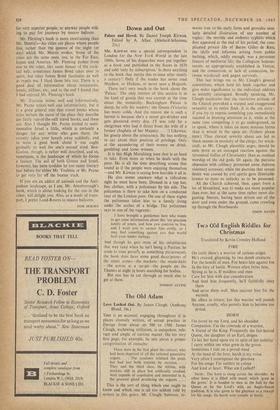The Old Adam
THIS is an account, engaging throughout if in places clumsily written, of sexual practice in Europe from about AD 500 to 1500. James Cleugh, eschewing titillation, is outspoken, rele- vant and ample of curious matter. On his very first ,page, for example, he sets about a proper categorisation of eunuchs: There were in the first place the castrati, who had been deprived of all the external generative organs. . . . The spudones retained the penis but had lost both testicles by excision. . . . They and the third class, the thlibice, with testicles still in place but artificially crushed, were capable of copulation and interested in it, the prostate gland producing the orgasm. . . .
This is the sort of thing which one ought to know and which one is all too seldom told by writers in this genre. Mr. Cleugh, however, re-
mains true to his early form and provides simi- larly detailed illustration of any number of topics: the terrible and endemic syphilis which first appeared at the end of his period; the com- plicated private life of Baron Gilles de Rais; the idylls and infamies arising from public bathing, which, oddly enough, was a persistent feature of mediaeval life; the Collegium Sodomi- torum, so appropriately established in Venice; and the connection, or lack of connection, be- tween witchcraft and pagan survivals.
This last brings me to Mr. Cleugh's general contentions, which hold his bo6k together and give wider significance to the individual oddities so amiably catalogued. Broadly speaking, Mr. Cleugh maintains' that the restrictive attitude of the Church provoked a warped and exaggerated sexuality in its entire flock. It is the old story: if you try to repress something you immediately succeed in drawing attention to it, while at the same time compelling it to go underground, so to speak, where it takes on more noxious forms than it would in the open air. (Ushers please note.) Thus clerical severity about sex led to black masses in mockery of the clergy; for witch- craft, as Mr. Cleugh plausibly urges, should be seen more as an outraged reaction against the tyrannical follies of Christianity than as residual worship of the old gods. Or again, the patristic obsession with celibacy promoted some dubious visionary ecstasies; while the doctrine that sexual desire was caused by evil spirits gave illimitable licence to nuns so unlucky as to be possessed.
All the Church achieved, then, apart from a lot of bloodshed, was to make sex more popular than ever, but at the same time rather more dis- gusting. Nature, having been driven out of the door and even under the ground, came crawling up through the floorboards.
SIMON RAVEN






























 Previous page
Previous page